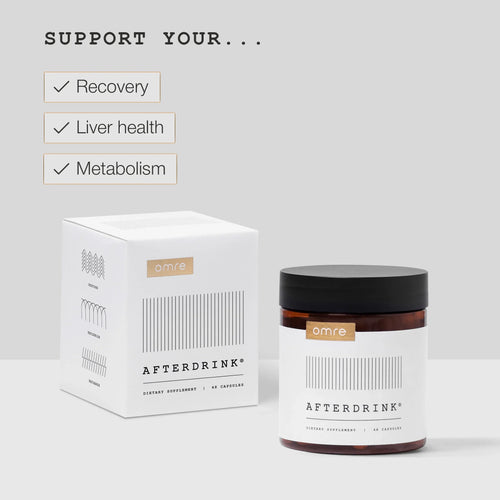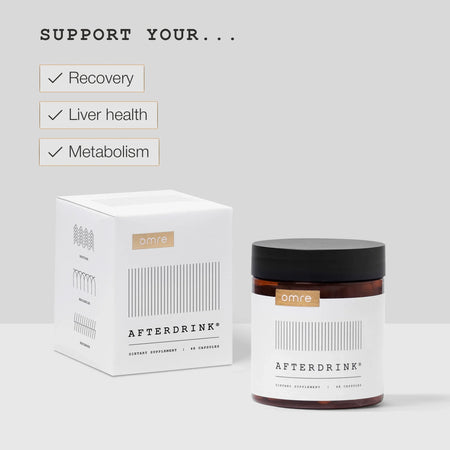Table of Contents
Is ginger good for a hangover? If you’ve landed on this page, then the chances are you’re looking for something to take away some of the pain caused by last night's antics.
And, you’re not alone. The search for an elusive hangover cure is always ongoing because I think you’ll agree that nothing really works that well.
Could ginger be the answer to your hangover woes?
In this article, we’re going to take a closer look at gingers’ health benefits and whether it’s good to take when hungover.
With so many false health claims our there, it’s hard to separate the facts from the fads. That’s why we’re going to base our article on published research papers to give you a scientifically accurate answer.
AFTERDRINK®
A supercharged antioxidant designed to support recovery, made from the very best, research-backed ingredients on the market.*
Benefits of ginger
Ginger is among the healthiest spices on the planet with many proven health benefits. It is loaded with nutrients and bioactive compounds that have powerful benefits for your mind and body.
Anti-sickness
Ginger is one of the best natural anti-sickness remedies around. Several studies have shown that it’s effective for treating morning sickness, seasickness as well as nausea after surgery or chemotherapy.(1)
Anti-inflammatory
The active ingredient in ginger is called gingerol and it’s been shown to have anti-inflammatory properties. Studies have shown it’s potentially effective in reducing joint and muscle pain.(2)
Antioxidant
Ginger is also a powerful antioxidant which means it helps your body neutralize free-radicals. These are produced as a by-product of metabolism and react with your cells to cause inflammation.(3)
In summary, ginger is a well-researched traditional herbal remedy that has proven benefits. Next up, we’ll look at whether these benefits make ginger a good thing to take for hangovers.
Is Ginger good for hangovers?
Ginger's natural anti-inflammatory and soothing properties may help with hangovers by reducing nausea and easing muscle aches. Adding fresh ginger to boiling water for tea is a simple remedy. However, ginger is not a proven cure and should be viewed as supportive rather than a definitive solution for hangover symptoms.
So, how does ginger stack up as a hangover remedy? To answer that, let’s first look at what causes hangovers in the first place.
A hangover is a mix of dehydration, poor sleep, and inflammation, leading to symptoms like:
Nausea and vomiting
Headache
Dry mouth and dehydration
Muscle aches
Anxiety
Trouble focusing
For ginger to help, it needs to tackle at least some of these symptoms—and it might just tick a few boxes.
If hangover nausea is hitting you hard, ginger is a great place to start. It’s simple, safe, and effective. Slicing a few fresh pieces into boiling water makes an easy hangover tea that can help settle your stomach.
Ginger might also ease muscle aches—perfect after a long night on your feet.
But let’s be clear: ginger isn’t a magic bullet. It’s a herbal remedy, not a drug, and studies often use doses far higher than what you’ll get from a tea or supplement. While it can offer gentle support, it’s not a cure-all for hangovers.
How to take ginger for a hangover
You have many options at your disposal. The easiest is to slice a few fresh pieces and add it to boiling water. A little splash of lemon will make for the ideal soothing hangover tea.
However, the dose of gingerol (the active ingredient in ginger) that you’ll get from a homemade tea won’t be much.
Other options include taking ginger supplements which will have much higher concentrations. Look out for supplements with standardized extracts which means you’ll get exactly the concentration of gingerol that’s been claimed on the label.
AFTERDRINK®
A supercharged antioxidant designed to support recovery, made from the very best, research-backed ingredients on the market.*
When to take ginger for a hangover?
By the time you've woken up with a hangover, the damage from alcohol has already been done. In most cases, there’s limited benefit in taking something to try and “cure” a hangover. That’s because realistically, nothing much will help apart from time and sleep.
The beauty of ginger is that, unlike other herbal remedies, it could be effective when you already have a hangover. And that’s because of its anti-sickness properties which may help settle upset stomachs. So, when you decide to use ginger for a hangover depends on your goals.
Safety and side effects
Ginger is regarded as a safe herbal remedy. Studies have repeatedly shown no negative effects up to several grams a day.(4)
Most reputable supplements on the market contain around 150-500mg of ginger which is well within the safe limits.
That said, everyone is different and can respond differently to supplements. Particularly at the higher doses, it’s always best to tread with caution. This is especially true if you’re taking medication prescribed by your doctor which may interact. If unsure, get on the phone with your physician to make sure it’s OK for you to take.
Anything else to consider
Hangovers are a sign from your body that you’ve been drinking too much alcohol for your body to handle. Trying to use ginger or any other remedy to cure a hangover is not the best approach.
Prevention is key when it comes to hangovers and drinking plenty of water, limiting your alcohol intake, and eating a meal before going out gives you the best chance of waking up feeling OK.
You may also want to consider sticking to lighter-colored drinks with fewer congeners. These are naturally occurring compounds that give certain types of alcohol (like red wine and bourbon) their rich flavor and aroma. And congeners have been shown to make hangovers a lot worse. That’s why red wine hangovers are notoriously bad.
Ginger for hangovers – Final verdict
That brings us to the end of our look into ginger for hangovers.
We’ve walked you through the basic things you need to know about the benefits of ginger and how it can alleviate some of the symptoms of a hangover. It’s a safe and effective remedy for nausea in particular.
With all that said, ginger shouldn't be considered a hangover "cure". Unfortunately, the only way to cure a hangover is to prevent it from happening in the first place!





